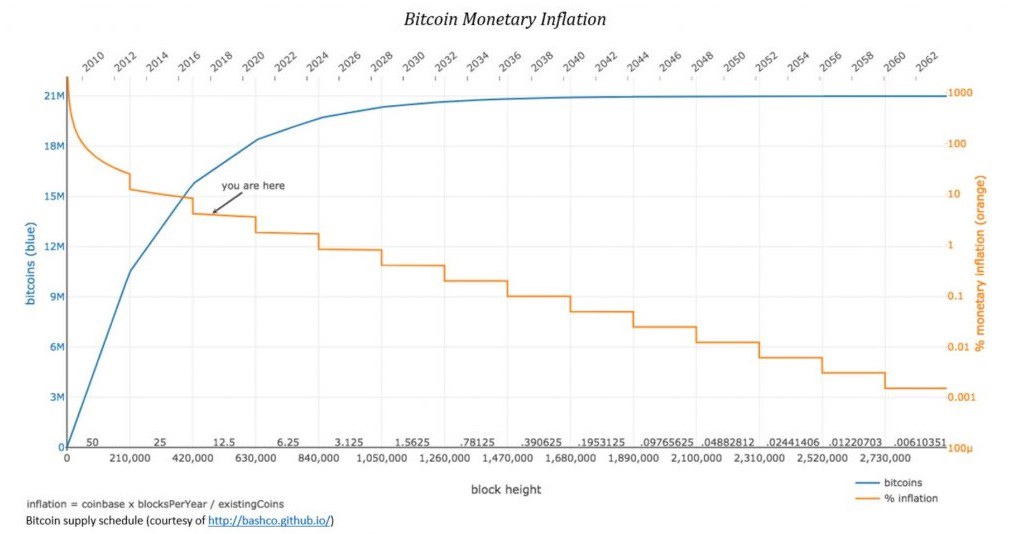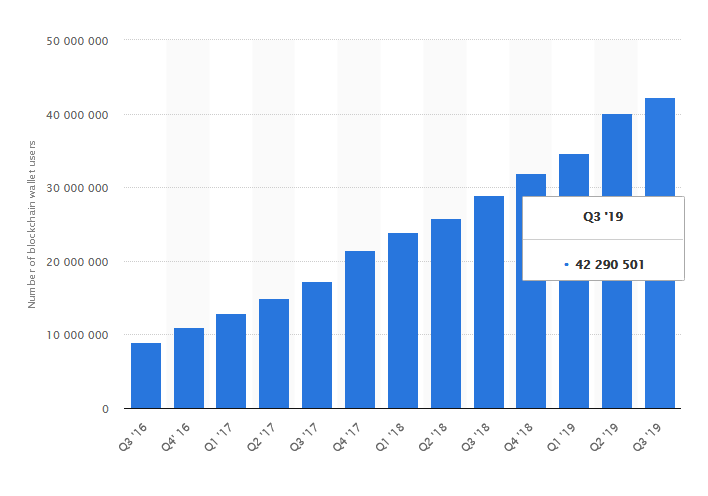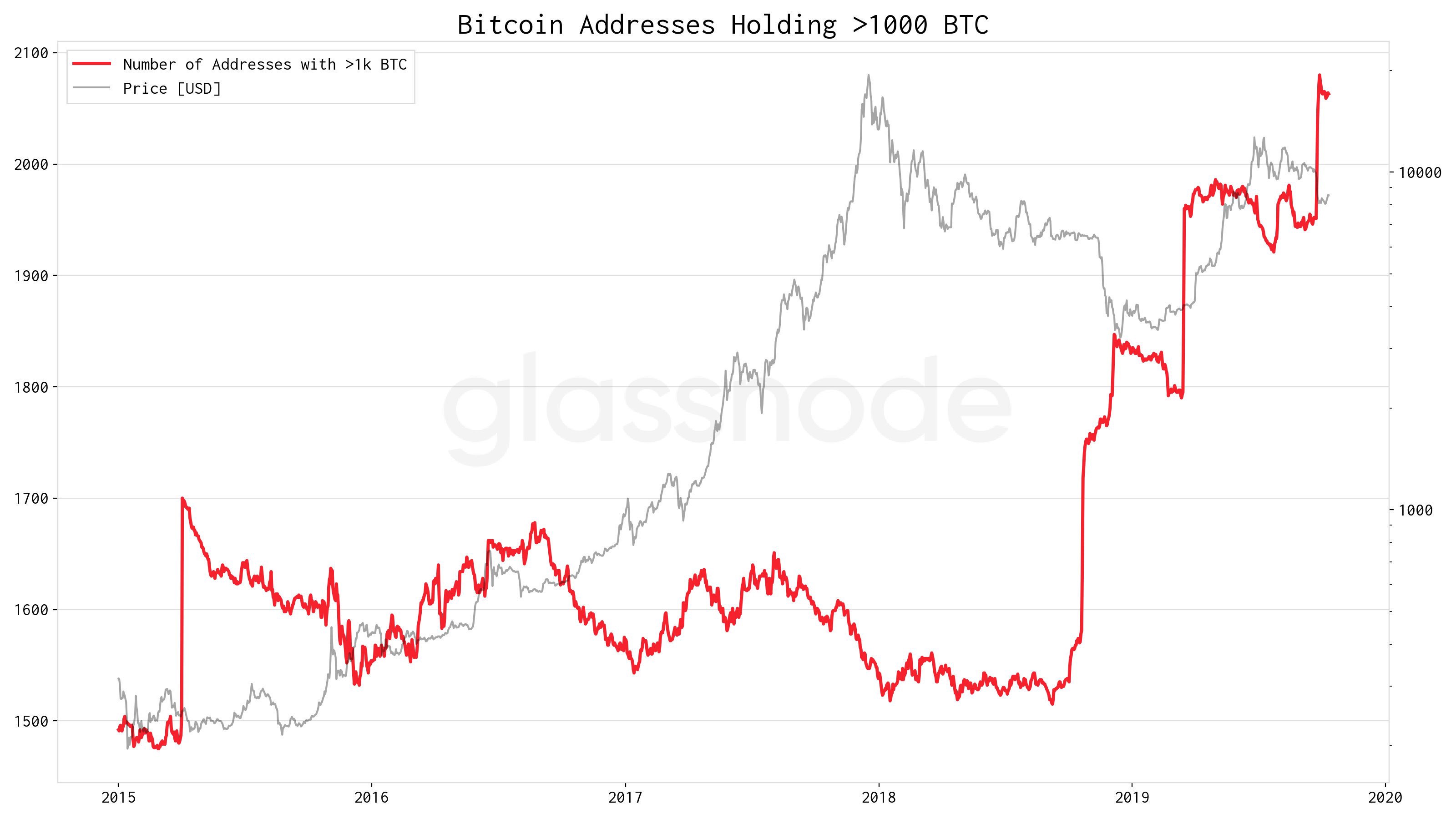Bitcoin will undoubtedly become more popular. While many people have already heard of Bitcoin, not many own it. An interpretation.
As a digital currency, Bitcoin has set limits on the supply side. The maximum number of Bitcoins is limited to 21 million. The current total amount is just under 18 million coins. Newly created Bitcoins are distributed to the miners as remuneration. The miners contribute computing power to ensure the blockchain system. At this stage, 12.5 newly created Bitcoins for new calculated blocks are transferred to miners. This happens every 10 minutes, what allows to calculate the current inflation rate, which is currently around 3.7% per year. The fee to the miners is halved every 4 years and thus 98% of the maximum number of Bitcoins have already been created in 2030. In the year 2140, the last block compensations should be paid out to the miners. After that, miners will only earn from the transaction costs that have to be paid for the transfer of Bitcoins.
Distribution: Wallet addresses and their inventory
According to Statista, more than 42 million Bitcoin Wallets had been set up by the end of the third quarter of 2019. This number is also reflected on Blockchain.com. The chart shows a steady increase over the last three years from just under 9 million wallet addresses in Q3 2016 to 42 million addresses in Q3 2019. The number of wallet addresses has thus grown by an average of 155% over the last three years.
While the majority of addresses have a Bitcoin equivalent between $1 and $100, addresses with a value of $100 to $10,000 are still very well represented with just over 9 million addresses. As expected, the distribution in the upper segment is becoming thinner.
Source: glassnode.com
The number of wallets exceeding 1,000 Bitcoins has recorded a strong growth since the end of 2018. The 1,341 addresses with a value greater than $10 million are often attributed to “cold storage wallets”s. However, the lost Bitcoins segment is also represented in this group.
Up to 20% “lost” Bitcoins
A considerable number of Bitcoins have been in the same wallet addresses for years. Much of them can be considered lost. A study by Delphi Digital specifically analyzed the Unspent Transaction Output (UTXO) data. Each time a part of BTC is issued, a new UTXO entry is created. From this it can be deduced how long Bitcoins have been in the same wallet address.
Bitcoins that have not been moved for more than 5 years have a high chance that the owners have lost access to their private keys and thus to their Bitcoins. It is also possible that they have already passed away. According to the analysis, up to 4 million Bitcoins could be “locked away” forever. An important part of it, more than 980,000 Bitcoins, is stored since the beginning on wallet addresses which are assigned to Satoshi Nakomoto.
Conclusion
The total amount of Bitcoins available is smaller than you might think at first glance due to “lost” Bitcoins. The inflation rate is decreasing according to the Bitcoin protocol. It is currently 3.7%. The fee in the form of newly created Bitcoins to the miners is halved every four years. The distribution to the miners will be halved again next year.
The distribution of Bitcoins to the wallet addresses continues to show a strong concentration on amounts below $100 but the almost 130,00 wallet addresses which hold values between $100,000 and $1 million equivalent to Bitcoins cannot be negated proportionally. The growth rate of newly created wallet addresses is sustainable at 155% p.a. over the last 3 years. The segment with stocks of more than 1000 Bitcoins is also recording strong growth.
Due to the structure of the Bitcoin network, there is hardly any data on the geographical distribution of the wallet addresses. The majority of wallet addresses is likely to be created in the ecosystem around the largest trading centers.
The second part of CVJ’s article will be published in CV Post’s November edition. It analyzes the users in the Bitcoin network and answers the question who is behind the wallet addresses and what are the intentions of the Bitcoin owners.








